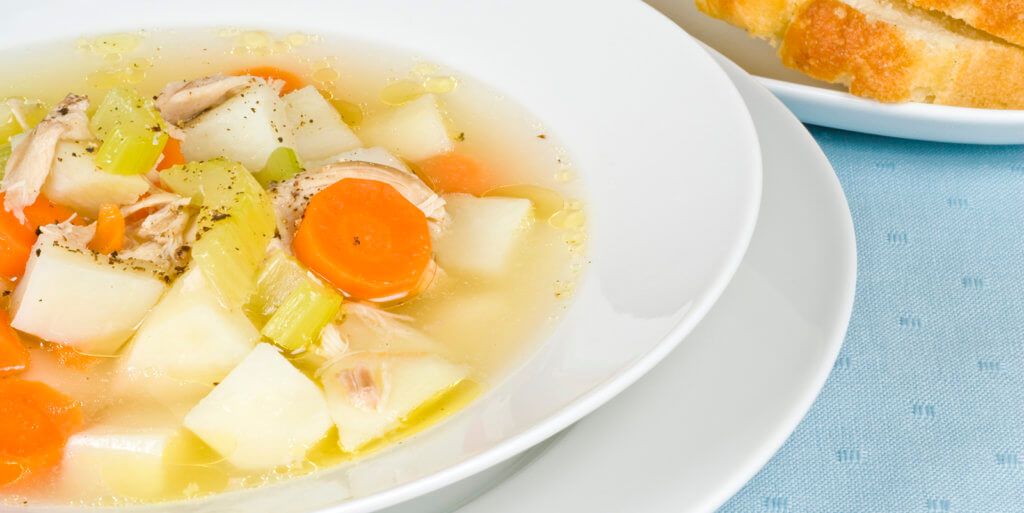
Whenever you got sick as a child, Mom or Dad would always come to the rescue with homemade chicken soup to make you feel better. There is nothing better than curling up on the couch with a big bowl of chicken soup when you're sick with a cold or flu. Chicken soup does seem to make you feel better, but is it all in your head? Can chicken soup really make you better when you are feeling under the weather?
It isn't just old wives that prescribed chicken soup to sick patients. The ancient Greek physician Galen, Arabic philosopher Avicenna, and 12th century Egyptian Jewish physician Moshe ben Maimonides all prescribed chicken soup for a variety of different ailments. Chicken soup has been used to treat the common cold for so long, some would wonder if it is actually making us feel better, or if we just think it is. Several scientists have set out to prove that chicken soup's seemingly medicinal qualities are more than just a placebo effect.
The most notable study of the effects of chicken soup on sick patients was done by Stephen I. Rennard MD of the University of Nebraska Medical Center in Omaha. His study titled Chicken Soup Inhibits Neutrophil Chemotaxis In Vitro was published by the journal CHEST Reviewers in October 2000. In this study, Rennard tested the effects of chicken soup in a lab by using blood samples given by non-smoking volunteers and diluted samples of his wife's generations old chicken soup recipe, dubbed "Grandma's soup" in the study. The study showed that "Grandma's soup" was able to slow the movement of neutrophils, the most common type of white blood cell, which in theory could reduce inflammation and side effects such as coughing, sneezing and stuffy nose by slowing the process by which these white blood cells gather in the lungs. The study was unable to determine what exactly in the soup caused the anti-inflammatory effects, but surmised it could be from a combination of ingredients since similar effects were caused using several different types of chicken soup, including store bought varieties.
In 1978, a study titled Effects of Drinking Hot Water, Cold Water, and Chicken Soup on Nasal Mucus Velocity and Nasal Airflow Resistance was completed by doctors from Mount Sinai Medical Center in Miami, Florida. This study was able to show that the hot water and chicken soup helped the movement of mucus in the nose, with chicken soup being the most effective. Yet another study from the American Journal of Therapeutics in 2012 showed that Carnosine, a nutrient in abundance in chicken soup, was effective in fighting off and preventing flu virus. However, the effects of the Carnosine only last as long as the chicken soup is in your system, and the positive effects cease immediately upon excretion of said soup.
Chicken soup would also help to keep hydrated when suffering from a cold or flu and several common ingredients found in chicken soup contain healthy nutrients. Olive oil in the soup would help with the absorption of fat soluble vitamins from the carrots and celery while onions and garlic contain organosulfides, flavanoids, and other anti-oxidants.
It would appear science has proved that once again, Mom was right. Chicken soup does help you get over a cold or flu. So if you find yourself with the sniffles this cold or flu season, just curl up with a steaming hot bowl of chicken soup. And if you don't have your own chicken soup recipe, here is the recipe for Barbara Rennard's Grandma's Soup:
Ingredients:
1 5-6 lb Stewing hen or baking chicken;
1 Package of chicken wings;
3 Large onions;
1 Large sweet potato;
3 Parsnips;
2 Turnips;
11-12 Large carrots;
5-6 Celery stems;
1 Bunch of parsley;
Salt and Pepper.
Directions:
Clean the chicken, put it in a large pot, and cover it with cold water.
Bring the water to a boil.
Add the chicken wings, onions, sweet potato, parsnips, turnips, and carrots.
Boil about 1 1/2 hours.
Remove fat from the surface as it accumulates.
Add the parsley and celery.
Cook the mixture about 45 min longer.
Remove the chicken. The chicken is not used further for the soup.
Put the vegetables in a food processor until they are chopped fine or pass through a strainer.
Salt and pepper to taste.
Enjoy!
